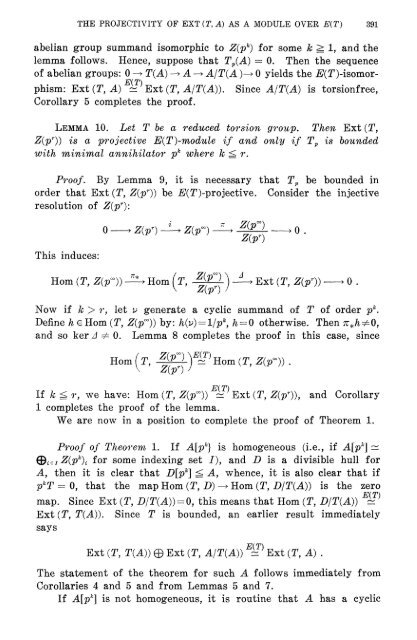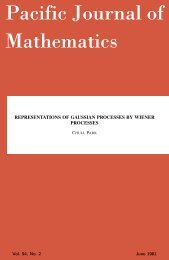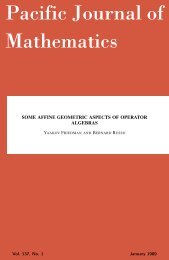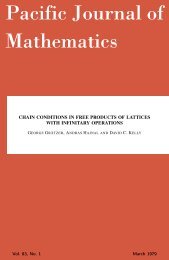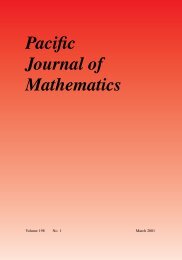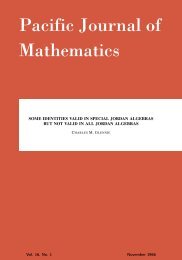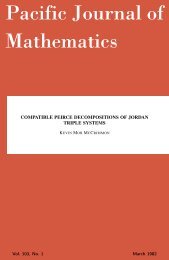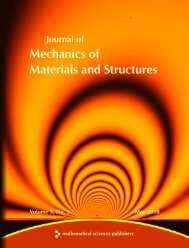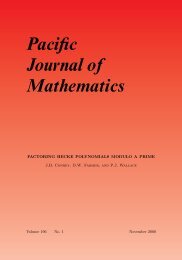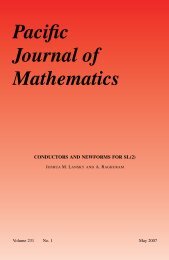The projectivity of Ext(T,A) as a module over E(T) - MSP
The projectivity of Ext(T,A) as a module over E(T) - MSP
The projectivity of Ext(T,A) as a module over E(T) - MSP
You also want an ePaper? Increase the reach of your titles
YUMPU automatically turns print PDFs into web optimized ePapers that Google loves.
THE PROJECTIVITY OF EXT (T, A) AS A MODULE OVER E(T) 391<br />
abelian group summand isomorphic to Z{p k ) for some kΞ> 1, and the<br />
lemma follows. Hence, suppose that T P<br />
(A) = 0. <strong>The</strong>n the sequence<br />
<strong>of</strong> abelian groups: 0 -> T(A) -> A -> A/Γ(A )-» 0 yields the £ r (T)-isomorphism:<br />
<strong>Ext</strong> (Γ, A) ^ <strong>Ext</strong> (T, A/T(A)). Since A/T(A) is torsionfree,<br />
Corollary 5 completes the pro<strong>of</strong>.<br />
LEMMA 10. Let T be a reduced torsion group. <strong>The</strong>n <strong>Ext</strong> (T,<br />
^(p r )) ^ a protective E(T)-<strong>module</strong> if and only if T p<br />
is bounded<br />
with minimal annihilator p k where k <strong>Ext</strong> (T, Z(p*)) > 0 .<br />
Now if k > ?, let v generate a cyclic summand <strong>of</strong> T <strong>of</strong> order p k .<br />
Define A e Horn (Γ, ^(p 00 )) by: h(v) = l/p\ h = 0 otherwise. <strong>The</strong>n πjιφ§,<br />
and so ker A Φ 0. Lemma 8 completes the pro<strong>of</strong> in this c<strong>as</strong>e, since<br />
Horn (Γ, J^)^ Γ ) Horn (Γ,<br />
If & ^ r, we have: Horn (Γ, ^(p w » ^T) <strong>Ext</strong> (Γ, Z(p r )), and Corollary<br />
1 completes the pro<strong>of</strong> <strong>of</strong> the lemma.<br />
We are now in a position to complete the pro<strong>of</strong> <strong>of</strong> <strong>The</strong>orem 1.<br />
Pro<strong>of</strong> <strong>of</strong> <strong>The</strong>orem 1. If A[p k } is homogeneous (i.e., if A[p k ] cz<br />
0 ΐe<br />
i^(p fc )i for some indexing set /), and D is a divisible hull for<br />
A, then it is clear that D[p k ] ^ A, whence, it is also clear that if<br />
p k T - 0, that the map Horn (Γ, D) -> Horn (T, D/T(A)) is the zero<br />
map. Since <strong>Ext</strong> (Γ, D/T(A)) = 0 f<br />
this means that Horn (Γ, D/T(A)) E ~ ]<br />
Έxt(T,T(A)). Since Γ is bounded, an earlier result immediately<br />
says<br />
<strong>Ext</strong> (T, T{A)) 0 <strong>Ext</strong> (T, A/T(A)) E ~ ] <strong>Ext</strong> (T, A) .<br />
<strong>The</strong> statement <strong>of</strong> the theorem for such A follows immediately from<br />
Corollaries 4 and 5 and from Lemm<strong>as</strong> 5 and 7.<br />
If A[p k ] is not homogeneous, it is routine that A h<strong>as</strong> a cyclic


